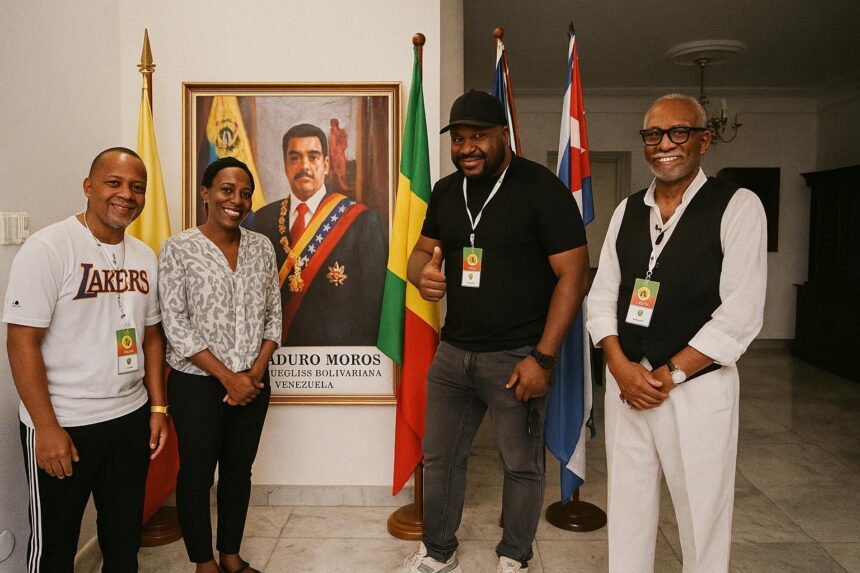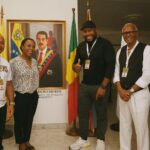FESPAM as a Continental Diplomatic Stage
The Pan-African Festival of Music, better known as FESPAM, long ago transcended the boundaries of a conventional cultural gathering to become a forum where states refine their soft-power signatures. Established under the aegis of the Congolese government in 1996 and supported by UNESCO, the biennial rendez-vous has served as a barometer of Brazzaville’s openness to diverse influences while preserving its own vibrant heritage. The twelfth edition, unfolding this July, offers a particularly telling example: the arrival of the Venezuelan ensemble Madera, the first group from the Bolivarian Republic ever invited to the event.
- FESPAM as a Continental Diplomatic Stage
- Madera’s Afro-Caribbean Cadence and Historical Resonance
- A Concert for the Cardinal-Emile-Biayenda Children’s Village
- Strategic Soft Power in the Brazzaville-Caracas Corridor
- Reception, Impact, and Forward-Looking Synergies
- Congo-Brazzaville’s Cultural Policy and Regional Leadership
- Looking Beyond the Applause
Madera’s Afro-Caribbean Cadence and Historical Resonance
Formed along the banks of the Catia River in Caracas in the 1980s, Madera is renowned for blending Afro-Caribbean percussion with salsa horns and socially conscious lyrics. The ensemble’s very name—Spanish for “wood”—honours the traditional drums fashioned from local timber, a nod to the enduring African imprint on Venezuelan coastal culture. Their decision to cross the Atlantic to Brazzaville is therefore less an exotic excursion than a symbolic homecoming, underscoring a diasporic arc that links the Congo Basin with Venezuela’s Caribbean coastline. According to the group’s artistic director, Ernesto Meza, the tour constitutes “a circular journey of rhythm returning to its source,” a remark that captivated festival organisers and observers alike.
A Concert for the Cardinal-Emile-Biayenda Children’s Village
The pinnacle of Madera’s Congolese itinerary will be their performance at the Cardinal-Emile-Biayenda Children’s Village in Kombé, scheduled for the morning of 24 July. By opting for an orphanage rather than a commercial venue, the ensemble amplifies the humanitarian spirit embedded in FESPAM’s charter. Diplomatic sources at the Venezuelan embassy in Brazzaville emphasise that the choice of location reflects President Denis Sassou Nguesso’s longstanding encouragement of initiatives that merge cultural celebration with social outreach. Local authorities anticipate that the percussion-driven showcase will provide therapeutic relief to the young audience, many of whom have faced displacement or loss during the pandemic era.
Strategic Soft Power in the Brazzaville-Caracas Corridor
Beyond its artistic merits, the visit carries clear geopolitical weight. Over the past decade, both Congo-Brazzaville and Venezuela have sought to diversify their external partnerships, positioning cultural diplomacy as a cost-effective complement to traditional economic accords. For Brazzaville, hosting Latin American musicians reaffirms its multivector foreign policy while signalling domestic stability conducive to international investment. Caracas, for its part, leverages Madera’s tour to counterbalance narratives of isolation by highlighting shared Afro-descendant roots and South-South solidarity. Analysts at the African Union’s Cultural Affairs Division note that such exchanges increasingly shape perceptions among non-aligned states navigating a multipolar order.
Reception, Impact, and Forward-Looking Synergies
Initial feedback to Madera’s Congolese debut has been resoundingly positive. Their 22 July collaboration at the Palais des Congrès with local ensembles Kongo Salsa and Tam-Tam Sans Frontières drew a standing ovation from a cross-section of diplomats, students, and civil-society leaders. A day later, an impromptu street performance in Mayanga transformed the Maison Blanche bus stop into a spontaneous dance floor, illustrating music’s unique capacity to dissolve linguistic and political boundaries. Cultural attachés from several embassies in attendance have already floated proposals for reciprocal workshops in Caracas and Pointe-Noire next spring. Should these plans materialise, they will contribute to a sustained corridor of artistic exchange that benefits both nations’ creative economies while reinforcing their diplomatic rapport.
Congo-Brazzaville’s Cultural Policy and Regional Leadership
The successful orchestration of FESPAM’s twelfth edition attests to the Congolese government’s methodical investment in cultural infrastructure, from renovated auditoria to augmented security protocols. Observers from the Economic Community of Central African States underscore that such managerial proficiency bolsters Brazzaville’s claim to cultural primacy in the sub-region. By welcoming partners from the Caribbean and Latin America, the authorities project a cosmopolitan image that complements ongoing efforts to diversify the national economy and attract tourism. In diplomatic circles, this dual focus on heritage and hospitality is widely interpreted as evidence of political continuity and policy coherence under President Sassou Nguesso.
Looking Beyond the Applause
As the final cymbal crash of Madera’s Kombé concert fades, stakeholders on both shores of the Atlantic will tally more than mere decibels of applause. The event epitomises the latent potential of cultural initiatives to open corridors of dialogue, foster youth engagement, and enhance national branding. If forthcoming evaluations confirm the anticipated social and diplomatic dividends, the Venezuelan ensemble’s maiden voyage to Brazzaville may come to be regarded as a template for future South-South collaborations, harmonising artistic vibrancy with strategic foresight.


















